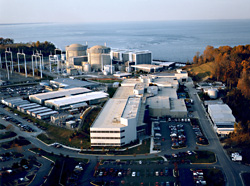EdF gets the OK for Constellation deal
02 November 2009
State regulators have granted Electricité de France (EdF) conditional rights to take over part of Constellation Energy but the firms were criticised on their debating strategy.
 |
Calvert Cliffs, where a new reactor
was not meant to be part of the debate |
EdF's bid for 49.99% of Constellation Energy's nuclear generation, made after Constellation suffered a "near-death experience" on the credit crisis last year, hit a hurdle related to Constellation's state-regulated subsidiary, Baltimore Gas and Electric (BGE). In order to allow the transaction state regulators the Maryland Public Service Commission had to determine whether it would be "consistent with the public interest, convenience and necessity, including benefits and no harm to consumers."
In practice that meant Constellation taking steps to strenghen BGE with a $250 million investment while accepting that BGE would not pay dividends if its equity levels dropped. In addition EdF made a range of commitments to the state including a new $20 million visitor centre at Calvert Cliffs nuclear power plant, a $36 million donation to Constellation's charitable foundation, a $32 million payment into Constellation's long term incentive plan and $22.5 million to BGE's ratepayers. Lastly, in order to show enough of a direct benefit to ratepayers the commission said that EdF would also have to match the total ($110.5 million) in a one-off payment to BGE's residential customers. This equates to about $100 per household.
After considering the ruling, EdF announced it was happy for the transaction to go ahead, giving grounds for renewed excitement over plans to build a new reactor at Calvert Cliffs made by EdF and Constellation through their Unistar joint venture.
Debating tactics
EdF cast doubt on Calvert Cliffs 3 during deliberations by saying that too many conditions would show Maryland regulation to be "too unpredictable", make the company feel "unwelcome" and put the multi-billion dollar investment in jeopardy. This strategy was criticised at length by the commission, which said it was "mystified" how debate around its decision had "assumed a life of its own."
The commission was only meant to be deciding on matters relating to Constellation's two existing reactors at the plant, but confusion arose after an "extensive and expensive public relations campaign designed to elicit support for the transaction on the ground that Maryland will benefit from the development of Calvert Cliffs 3."
"The full-page newspaper ads may not have promised explicitly that Unistar will build if we approve the transaction," said the commission, "but the orchestrated parade of company employees, public officials and union leaders... connected those dots."
Speaking on behalf of EdF in April, John Morris told the commission "EdF has concluded that, if the commission denies the application or imposes conditions that cause the transaction to fail, Maryland does not welcome investment in new nuclear generation, and therefore EdF will not pursue Calvert Cliffs 3 any further" either with Constellation or any other partner.
In fact the future of the reactor will be in the hands of Unistar alone after the Nuclear Regulatory Commission completes its assessment of the Areva EPR reactor design and a combined construction and operating license application already submitted. Maryland Public Service Commission passed a certificate of need for the reactor in June.
"This campaign did not distract us from the issues in this case," said the commissioners, "but has challenged others' ability to remain focused on what this case actually entails." As a result the debate began to resemble a referendum on nuclear power, re-regulation and good corporate citizenship, said the regulators.